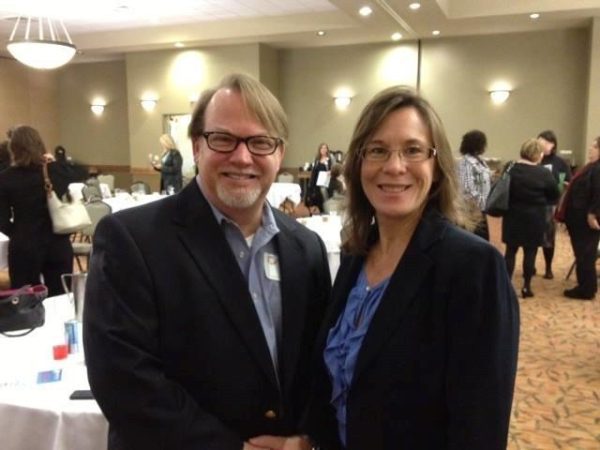Dr. Bill Saunders and Dr. Elizabeth Racine Help Cabarrus County Community Leaders Tackle Childhood Obesity

UNC Charlotte Public Health researchers Dr. Bill Saunders and Dr. Elizabeth Racine have partnered up with Carolinas Medical Center-NorthEast and Cabarrus County community stakeholders to develop a childhood obesity action plan.
Recent numbers suggest that 23% of children in the U.S. are obese and medical care costs for this group can run into billions of dollars. Children who classify as obese are at risk for diabetes, heart disease, cancer and premature death. Obese children are also highly likely to contract diabetes as adults, according to Saunders, Assistant Professor in the College of Health and Human Services at UNC Charlotte (CHHS).
An attempt to negate the epidemic of childhood obesity requires a multifaceted and interdisciplinary approach led by community leaders, policy makers, educators, health providers, and researchers.
As part of the Cabarrus County Childhood Obesity Action Plan, Saunders and Racine, along with a team of UNC Charlotte researchers that includes Diane Gavarkavich and Dennis Alcorn, met with 60 people from the Cabarrus community to develop a systematic method of gathering information from Cabarrus County community members concerning critical areas that relate to childhood obesity. The meeting also included stakeholders from local government, public health officials, local businesses, CHS staff, health care researchers, members of the faith community, and representatives from the school systems in Cabarrus County.
Currently, both Mecklenburg County and Cabarrus County have programs and initiatives aimed at reducing childhood obesity but there is insufficient data to demonstrate their efficacy. Thus, health research is necessary to identify and further grow successful efforts. Health researchers who work collaboratively with the community apply evidence-based interventions, and evaluate the impact of these programs.
Approximately 20 community leaders with expertise or interest in children, nutrition, physical activity, education and healthcare were identified to serve on the project steering committee. Focus groups were conducted with approximately 50 individuals who had expertise in education, nutrition, physical activity, research, healthcare, policy, community needs, and business. These focus groups were asked to brainstorm programs and policies that may be effective locally to prevent childhood obesity. Parents of children in both the county and in the Kannapolis City school district were surveyed to identify types of interventions and policies that would also help.
The UNC Charlotte team then used all the data to identify five priority areas. The five areas deemed high priority for interventions are: 1) integration of more health, physical education and nutrition education throughout grades K-12; 2) the development of messages to identify the benefits of healthy eating as well as being physically active; 3) the implementation of parent, caregiver and healthcare provider education and other interventions in the areas of nutrition and physical activity; 4) the expansion of greenways as well as increased accessibility to parks; 5) the implementation and expansion of policies that encourage a decrease in the consumption of sugar-sweetened beverages.
The UNC Charlotte research team will assist a long-term implementation team of 10-15 Cabarrus community stakeholders in targeting the five priority areas, identifying potential funders, writing grants, educating the community and policy makers, and overseeing obesity interventions.
Racine and Saunders will also continue to partner with community leaders to address childhood obesity. The group is now focusing on a Mecklenburg County coalition aimed at childhood obesity as well as helping with a project in Cabarrus County that targets preschool children and addresses healthy eating, food preparation and menu planning.
With these initiatives, UNC Charlotte Public Health researchers are providing critical support and expertise to assist local communities as they address the complex issue of childhood obesity.